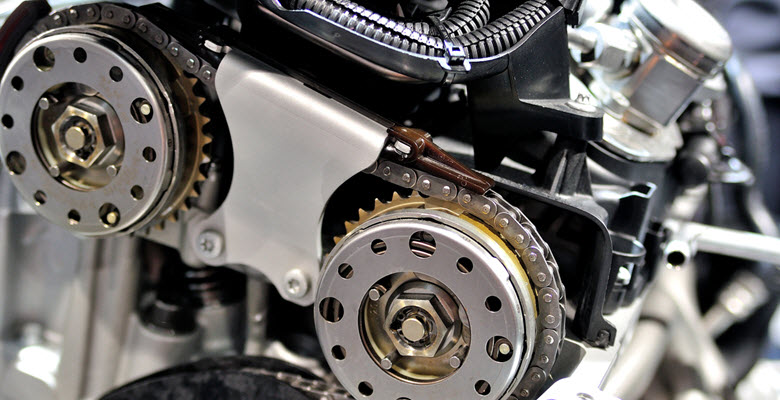Timing chains in any vehicle serve an important function, which we’ll get to in a moment; however, some cars are prone to timing chain failure or malfunction, such as Volkswagens, so it’s important to know what to expect if yours fails. In Volkswagen vehicles, the issue of timing chain failure is prominent. Timing chains can become worn over time and break, causing catastrophic engine damage and further repair needs, so it’s best to stay on top of routine maintenance, frequent check-ups, and timing chain inspections. In this article, we’ll go over why your VW’s timing chain is important, what you should be on the lookout for when or if it fails, and what you can do to address the issue in the future.
Why is Your VW’s Timing Chain Important?
Timing chains, also referred to commonly as timing belts, are critical components in every vehicle, as we mentioned before. For any car with an internal combustion engine, such as Volkswagens, the timing chain lies in the front of the engine where it is connected to a series of other components, which help the chain move seamlessly. How it works is, the chain links connect with the crankshaft and camshaft to regulate how the combustion process performs.
The timing chain produces power through quick rotation, and through this mechanism the chain can become worn out, damaged, and can even snap if it isn’t replaced in a timely manner. As the chain is under high heat conditions from the engine, it begins to loosen and stretch out, which can compromise its integrity and become very dangerous while traveling at high speeds especially. It’s important to know what components are associated with the timing chain mechanism and should be looked at when your timing chain begins to fail. Here are a few to consider:
- Chain linkages
- Cylinder head valves
- Pistons
- Rods
- Camshaft components
- Crankshaft components
- Timing chain tensioner
- Pulleys
- Gears
Is It a Volkswagen Problem?
As we’ve mentioned, it is quite normal for timing chains to become worn over time, especially in vehicles that see a lot of action. Some contributing factors may include:
- The climate you live in and elements your car is exposed to
- Frequent driving conditions (like stop-and-go traffic)
- Individual driving habits (quick acceleration and braking)
- Mileage of the vehicle
- Consistency of maintenance (adherence to maintenance schedule)
- Age of vehicle
With all of this in mind, it is also important to recognize that Volkswagen cars are especially known for premature timing chain failure. Furthermore, the older the car and the higher the mileage, the more prone your VW is to timing chain failure. The Volkswagen manufacturer has even attempted to address this issue in several different lawsuits, but little has been done to remedy the problem. Addressing this VW issue is important, as it can lead to:
- Performance issues
- Warning light illuminations
- Starting difficulty
- Engine damage and/or failure
- Steering difficulty or limp mode engagement
Performance Issues Related to Timing Chain Failure/Malfunction
It’s important to pay attention to how your car behaves so that you can become aware of any changes in the effectiveness of your VW’s timing chain. In order to avoid these issues, it is critical to adhere to your VW’s maintenance schedule (found in your owner’s manual) and collaborate with a Volkswagen specialist regularly. Here are a few symptoms that may precipitate or accompany timing chain malfunction:
- Engine misfiring
- Problems with engine oil clarity and quality
- Difficulty generating engine power
- Sudden steering difficulty (entering limp mode)
How to Stay Proactive
As we mentioned before, it is essential to stay on top of your VW’s routine maintenance tasks in an attempt to prevent timing chain problems. The last thing you want to do is wait until the timing chain snaps, as this could lead to more severe engine damage and higher repair bills, or even an irreparable problem. Here are some things you can do to stay proactive:
- Make it a point to routinely have your VW’s timing chain and tensioner (as well as previously mentioned parts) inspected.
- Stay on top of regular oil changes, as this can prevent oil contamination and premature timing chain wear due to tiny metal particles corroding the chain.
- Don’t wait to address any problems with your Volkswagen, including concerning symptoms related to timing chain failure.

Here at Germany’s Best, we specialize in Volkswagen vehicles for residents of Berkeley, Emeryville, Piedmont, and Oakland, CA. If you’ve recently experienced issues related to your VW’s timing chain, please contact one of our VW experts right away to assess the issue – your safety is of the utmost importance to us.
* Volkswagen Tiguan image credit goes to: y_carfan.






 Mon – Fri: 8:00 AM to 5:00 PM
Mon – Fri: 8:00 AM to 5:00 PM 5291 College Avenue in Oakland, CA 94618
5291 College Avenue in Oakland, CA 94618 510-658-8948
510-658-8948